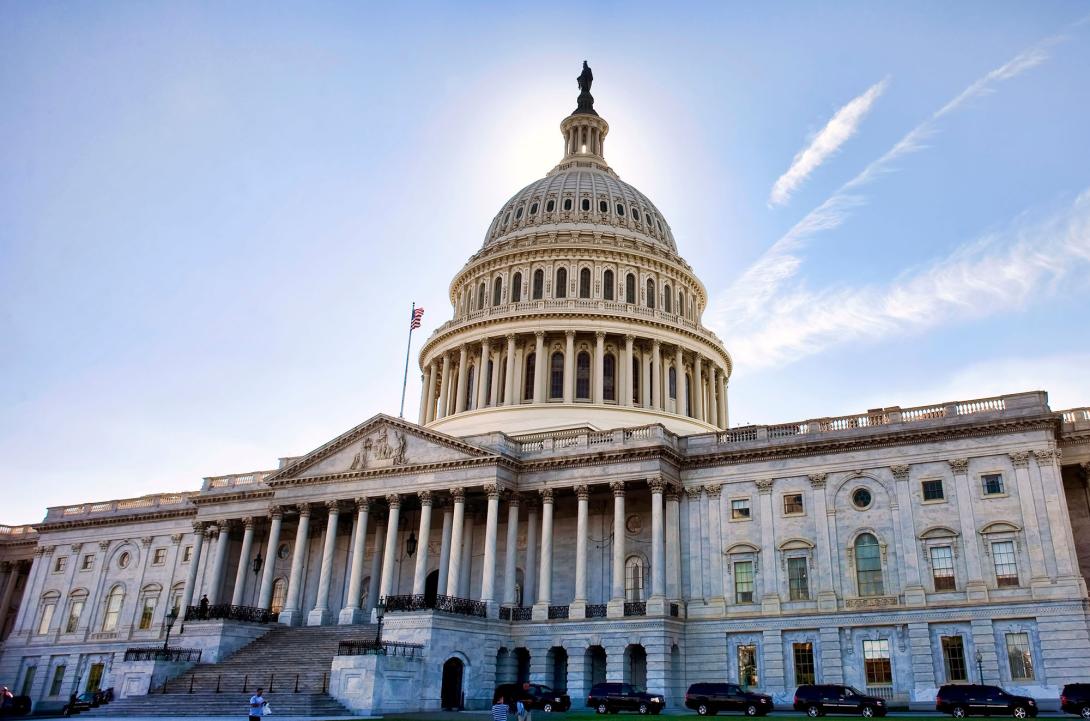The United States Needs To Act Now, and on Many Fronts, To Combat the Risks From China
Chairman John Moolenaar, R-Mich., and ranking member Raja Krishnamoorthi, D-Ill., of the House Select Committee on the Chinese Communist Party, are warning of many risks that come from the People’s Republic of China (PRC). As the country moves to gain world dominance, it is thwarting the international rules-based order, violating human rights, conducting illegal maritime trade, asserting or threatening its dominance against other territories, and to back up its power, is pursuing a rapid military expansion. Inside the United States, the PRC has taken steps in academia, with technology and in other areas that threaten our country’s national security.
As such, the House committee has taken several steps this Congress to confront the issues.
On the academic front, several U.S. universities still have direct partnerships with Chinese universities. The Chinese schools, in turn, support the PRC’s People’s Liberation Army and its efforts to gain technological advantage over the United States. House Select Committee lawmakers are now asking Eastern Michigan University (EMU), Oakland University and the University of Detroit Mercy to end their partnerships with Chinese universities.
Last year, the Georgia Institute of Technology, the University of California Berkeley and the University of Michigan announced the terminations of their joint institutes with China—in response to a similar request from the committee.
“The research at your university is funded by the American people and it must be protected,” Chairman Moolenaar and Chairman Tim Walberg, R-Mich., of the House Education and Workforce Committee stated in a February 20 letter. “The PRC systematically exploits the open research environment in the United States—actively engaging in theft, espionage, and other hostile actions against U.S. universities perpetrated by the Chinese Communist Party. The universities’ PRC collaborations jeopardize the integrity of U.S. research, risk the exploitation of sensitive technologies and undermine taxpayer investments intended to strengthen America’s technological and defense capabilities.”
For example, EMU has partnerships with China’s Beibu Gulf University and Guangxi University.
The Maritime College at Beibu trains students who are wartime reserve forces and operates a $2.5 million simulation complex that has prepared over 20,000 personnel at the China-ASEAN Waterborne Training Base, according to the lawmakers.
“This training directly supports the CCP’s aggressive attempts to claim the territory of U.S. partners in the South China Sea,” the congressmen indicated.
EMU is a National Center of Academic Excellence in Information Security funded by the National Security Administration. It is positioning itself as a critical hub to export advanced cybersecurity expertise and cultivate world-class information technology professionals. Guangxi University, meanwhile, has openly stated its intent to leverage EMU’s expertise for its gain. Moreover, EMU also hired Yifei Chu, a Chinese citizen who had pleaded guilty to lying to U.S. officials about working on a classified naval project.
Risks abound in semiconductor trade, especially related to artificial intelligence (AI), according to the congressional committee.
A January 30 letter from the committee to Michael Waltz, the U.S. national security advisor, called for export controls on U.S. semiconductor chips, specifically chips used by the PRC’s AI company DeepSeek. This included a request to close export control loopholes that allow other countries to divert shipments of U.S. semiconductor chips to the PRC. In addition, the lawmakers warned that the DeepSeek tool enables user data to flow back to the PRC as part of its stated privacy policy.
The lawmakers warned that DeepSeek had made extensive use of NVIDIA’s so-called H800 graphics processor chip—reportedly using more than 2,000 of the GPUs to train its V3 version of the DeepSeek model.
“DeepSeek made extensive use of Nvidia’s H800 chip, the first chip that Nvidia designed specifically to fall outside U.S. export controls,” the lawmakers stated. “This demonstrates what the Select Committee has long argued: frequently updating export controls is imperative to ensure the PRC will not exploit regulatory gaps and loopholes to advance their AI ambitions.”
The committee leaders asked Waltz to update contracting language in the Federal Acquisition Regulations to prohibit the federal government from acquiring AI systems based on models from the PRC, except for appropriate intelligence and research purposes. They also requested to restrict the use of such PRC AI systems in U.S. critical infrastructure.
“To protect American leadership in AI, the United States must swiftly strengthen export controls on the technology behind DeepSeek’s model, and also use the Information and Communications Technology and Services to block DeepSeek’s operations in the United States,” Moolenaar stated in the letter. “Like any claims from China, Americans should be skeptical of DeepSeek’s self-reported development costs. In this case, the rapid growth and CCP control behind the company raises serious national security concerns and demands immediate action.”
Overall, the United States needs to strengthen its technological development regarding advanced capabilities, such as AI, Krishnamoorthi told SIGNAL Media in an interview.
“Substantively, I’d like to see us work on improving the competitiveness of our country, especially with regard to advanced technologies to win the competition with China in any number of areas, from quantum to artificial intelligence and nanoscale computing to robotics and the list goes on and on. [These are] areas that are going to be crucial for our prosperity in the future.”
For the ranking member, that means fixing the U.S. immigration system to continue to attract and retain the best and brightest from around the world. “And it means upskilling our own workforce to work in those technologies of the future,” he said. “It means investing more in our basic research and development, which is crucial for innovation.”
Part of that effort needs to address our trade dependency on China. According to the Congressional Research Service, U.S. imports from China reached $427.2 billion in 2023. China has been a top trading partner of the United States since 2001 when China joined the World Trade Organization.
In addition to the United States’ dependency on China for trade, Krishnamoorthi sees risks from the PRC’s economic aggression. The activities, from cyber attacks to intellectual property theft, pose many challenges to the United States.
“Quite frankly, with regard to their economic aggression, I’m very concerned about their dumping of goods, whether it is solar panels, glass, steel, aluminum, paper, or whether it’s electric vehicles or electric batteries,” Krishnamoorthi noted. “I’m concerned that it’s intended to really destroy their competition in other parts of the world, including the United States, and it’s going to hollow out our industry. So, we should adopt policies that will put them on a level playing field. We have to make that very clear that we need to be on a level playing field with them if we’re going to compete and they are going to have access to our markets.”

We have to continue investing in that defense industrial base, as well as more generally, in our deterrence, in order to prevent conflict.
In addition, our trade with China brings other risks to our national security, including physical security, Moolenaar warned.
Moolenaar, along with House Committee on Homeland Security Chairman Mark E. Green, R-Tenn.; Subcommittee on Transportation and Maritime Security Chairman Carlos Gimenez, R-Fla; and Rep. Dusty Johnson, R-S. D., sent a letter to Acting U.S. Coast Guard Commandant Adm. Kevin Lunday on January 22, requesting information on what the Coast Guard is doing to mitigate the risks posed by PRC export companies—such as COSCO Shipping—and their operations in the U.S. Maritime Transportation System, including U.S. ports and waterways. The leaders have “significant concerns” about the associated national security risks from their operations in the United States.
“[We] identify these entities as contributors to the PRC’s defense industrial base, while underscoring COSCO Shipping’s integral role as a key facilitator in advancing the PRC’s military-civil fusion strategy,” the January 22 letter stated. “Given the PRC’s track record of exploiting commercial assets for intelligence and military purposes, COSCO Shipping’s expansive operations at major U.S. ports present significant national security concerns, including espionage, cyber intrusions, sabotage and supply chain disruptions. These concerns are amplified by COSCO’s substantial control over global container traffic and its proximity to U.S. critical infrastructure.”
The leaders also pointed out that COSCO’s vessels—like many other PRC state-owned merchant ships—frequently have Chinese Communist Party political leaders embedded in their crews, “further demonstrating the CCP’s direct influence over these operations.”
“Permitting vessels and personnel affiliated with COSCO Shipping to operate within U.S. ports without adequate safeguards exposes our nation to unacceptable risks, particularly during times of increased geopolitical tension,” the leaders stated. “As the lead federal agency for maritime security, the U.S. Coast Guard must take decisive action to mitigate these risks.”
The U.S. military as a whole, along with the U.S. defense industrial base, must be strengthened to provide deterrence against the PRC.
“Another [step] is bolstering our deterrence from a security and military perspective,” Krishnamoorthi continued. “Our defense industrial base is really creaking right now under the weight of so many challenges that it needs to deal with from around the world. We have to continue investing in that defense industrial base, as well as more generally, in our deterrence, in order to prevent conflict.”
Moreover, the United States must act now, Krishnamoorthi stressed. “I would say that when Xi Jinping says that the People’s Liberation Army needs to be ready by 2027 to successfully conquer Taiwan, that we need to take him at his word—and the PLA and others at their word—that they’re going to be ready,” he stated. “Our window of establishing deterrence is shrinking, and we need to hustle in terms of fixing our defense industrial base, but also working with our friends, partners and allies to increase deterrence in the region.”




Comments